theartsdesk at Wexford Festival Opera 2025 - two strong productions, mostly fine casting, and a star is born | reviews, news & interviews
theartsdesk at Wexford Festival Opera 2025 - two strong productions, mostly fine casting, and a star is born
theartsdesk at Wexford Festival Opera 2025 - two strong productions, mostly fine casting, and a star is born
Four operas and an outstanding lunchtime recital in two days
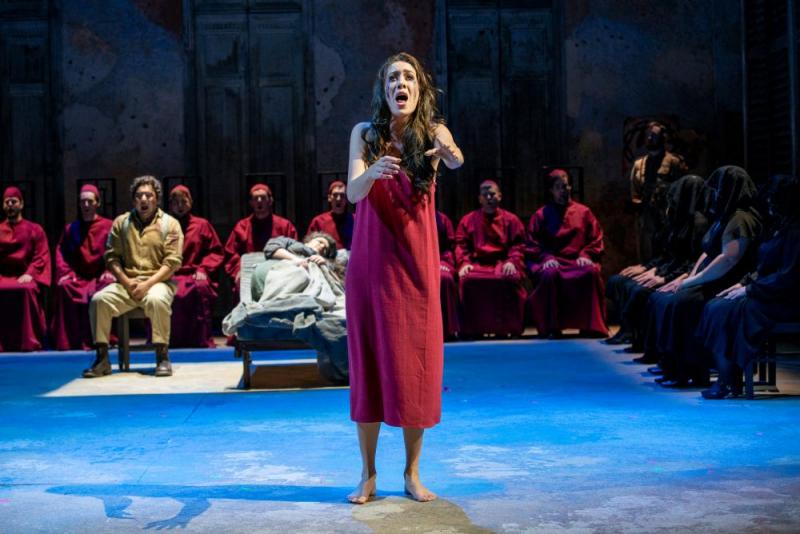
A drawback of choosing relatively or very obscure operas, as they've been mostly doing in Wexford Festival since 1951, is that the audiences probably won’t come out humming the tunes. That changed this year with the inclusion of Le trouvère, which most of us know – minus the ballet music and a few striking changes in this French version – as Il trovatore. A risk, since budget forbade big names in the four main roles, but the casting yielded unexpected treasures.
I'd go so far as to say a star is born in soprano Lydia Grindatto, taking on what notewise is the most demanding of them all, Leonore/Leonora. Admittedly she didn't have to manage the Act Four cabaletta cut from the Paris version featured in Wexford (★★★), but that scene is already massively taxing and there were no signs of strain, with long-breathed phrases shining again and again. As we discovered from a stupendous lunchtime recital the next day with Carmen Santoro as pianist (★★★★★), Grindatto's speaking voice is mezzo-ish, the essential colour is dark, but she carries the weight right up to a brilliant top, not coming at it from above but enriching it from below, as it were. 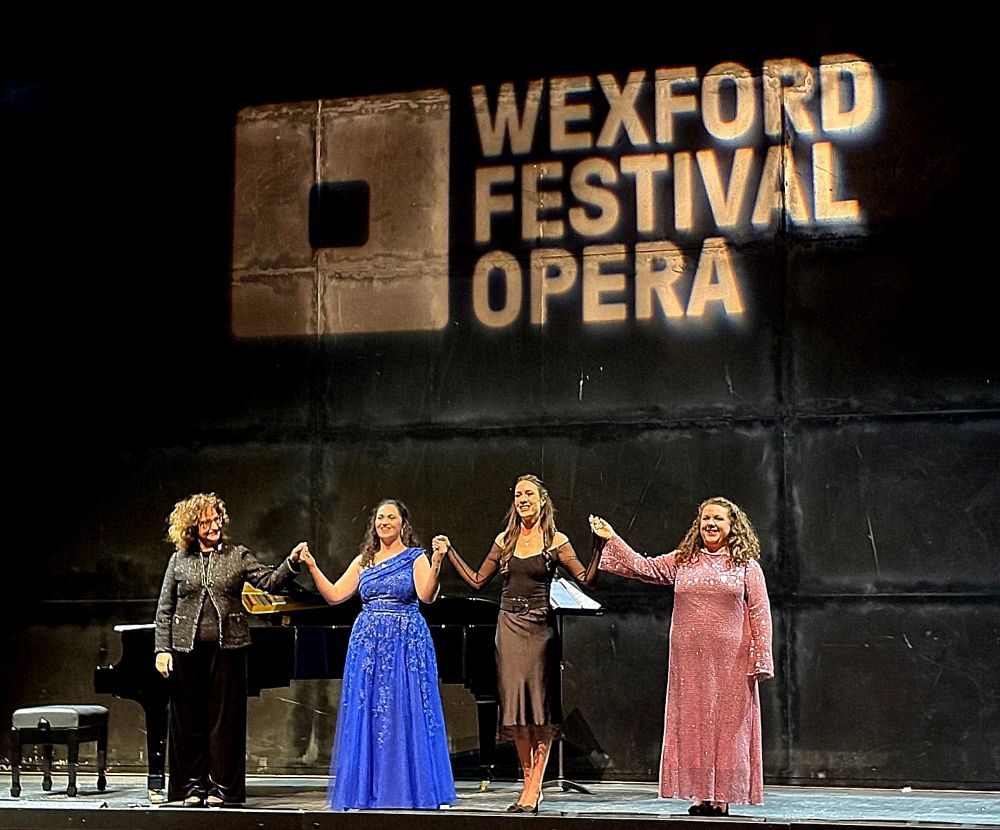 Curiously the best test of this was "Climb Ev'ry Mountain" from The Sound of Music, a great number which reflects, stepwise, its Alpine metaphor. Her generosity in sharing the programme with two other sopranos, mentored in the Wexford Factory young artists programme, paid off: Maria Matthews sang the "Doretta" aria from Puccini's La rondine, Laura Aherne Micaëla's Act Three outpouring from Bizet's Carmen, both very well (pictured above by Jim Chamberlain: Santoro, Aherne, Grindatto and Matthews). Their Irish folk-song encore was pure charm, followed by all three singers sharing the original Harold Arlen "Somewhere Over the Rainbow". But the real showstopper, after Grindatto had demonstrated her perfect line in Rusalka's "Song to the Moon" and the ascending/descending expressive portions of the scale in Respighi's "Nebbie", was the string of stunning top notes towards the end of "Robert, toi que j'aime" from Meyerbeer's Robert le Diable.
Curiously the best test of this was "Climb Ev'ry Mountain" from The Sound of Music, a great number which reflects, stepwise, its Alpine metaphor. Her generosity in sharing the programme with two other sopranos, mentored in the Wexford Factory young artists programme, paid off: Maria Matthews sang the "Doretta" aria from Puccini's La rondine, Laura Aherne Micaëla's Act Three outpouring from Bizet's Carmen, both very well (pictured above by Jim Chamberlain: Santoro, Aherne, Grindatto and Matthews). Their Irish folk-song encore was pure charm, followed by all three singers sharing the original Harold Arlen "Somewhere Over the Rainbow". But the real showstopper, after Grindatto had demonstrated her perfect line in Rusalka's "Song to the Moon" and the ascending/descending expressive portions of the scale in Respighi's "Nebbie", was the string of stunning top notes towards the end of "Robert, toi que j'aime" from Meyerbeer's Robert le Diable.
Grindatto was well-matched to her Enrique in Le trouvère, ideal tenor Eduardo Niave, but he came off especially badly in an inert production by Ben Barnes. I don't have a problem with an update to the Spanish Civil War, other than losing the point of gypsy anvils in a Madrid street scene of sundry Republicans (pictured below), but the crazy-violent plot needs explosive interaction between the love rivals, and though Giorgi Lomiseli had the right Verdi-baritone timbre, albeit with a slight barkiness, as the Comte de Luna, the "I pick up one chair, you pick up another and we lock them together for a bit" direction gave you no inkling this could be a conflict in which anyone would be wounded, let alone killed. 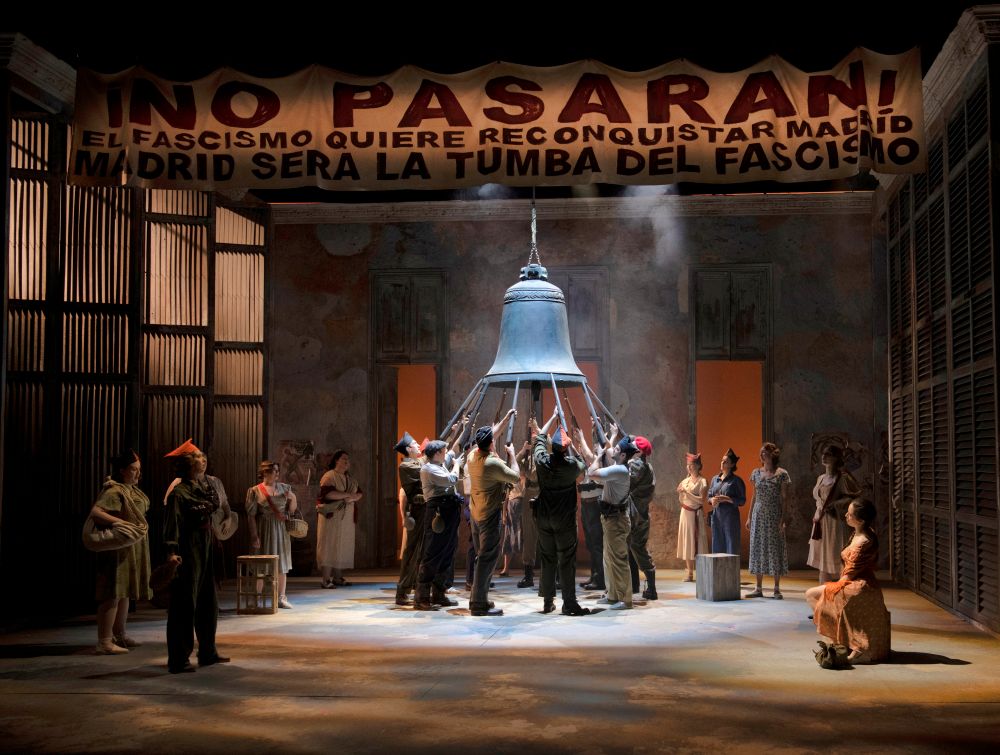 Nor was Ukrainian mezzo Kseniia Nikolaieva much helped in the nuttiest role, the revenge-crazed gypsy Azucena who may or may not be Manrique's mother. This is a unique voice, plummy in middle to upper register and unclear in the French but with the contralto chest voice the role absolutely needs. It's good to see her progress from the uncertain days of her Jette Parker apprenticeship at the Royal Opera. A fifth principal, Ferrand who gives the ballad-narrative of babies on bonfires in the opening scene, was poorly sung by Luca Gallo, but he too wasn't helped by delivering the narrative way upstage. Sets by Liam Doona and lighting shared between Daniele Naldi and Paolo Bonapace evoked the earthy colours of Spain, but this opera is more about darkness than light.
Nor was Ukrainian mezzo Kseniia Nikolaieva much helped in the nuttiest role, the revenge-crazed gypsy Azucena who may or may not be Manrique's mother. This is a unique voice, plummy in middle to upper register and unclear in the French but with the contralto chest voice the role absolutely needs. It's good to see her progress from the uncertain days of her Jette Parker apprenticeship at the Royal Opera. A fifth principal, Ferrand who gives the ballad-narrative of babies on bonfires in the opening scene, was poorly sung by Luca Gallo, but he too wasn't helped by delivering the narrative way upstage. Sets by Liam Doona and lighting shared between Daniele Naldi and Paolo Bonapace evoked the earthy colours of Spain, but this opera is more about darkness than light.
Of the Paris changes, some cadenzas sounded strikingly different, and the biggest surprise is the reprise of the "Miserere" just before the very end. But the vibrant ballet music needed comparable liveliness on stage; with no choreographer credited, three "dancers" played an indeterminate part in Luna's dream, at odds with the Civil War footage. The numbers poured forth with their inspired ideas, sometimes too fast under the baton of Manuel Hartinger, who had taken over for the rest of the run from an indisposed Markus Bosch. One main impression remained – how much genius Verdi lavished on a tawdry, muddled melodrama. 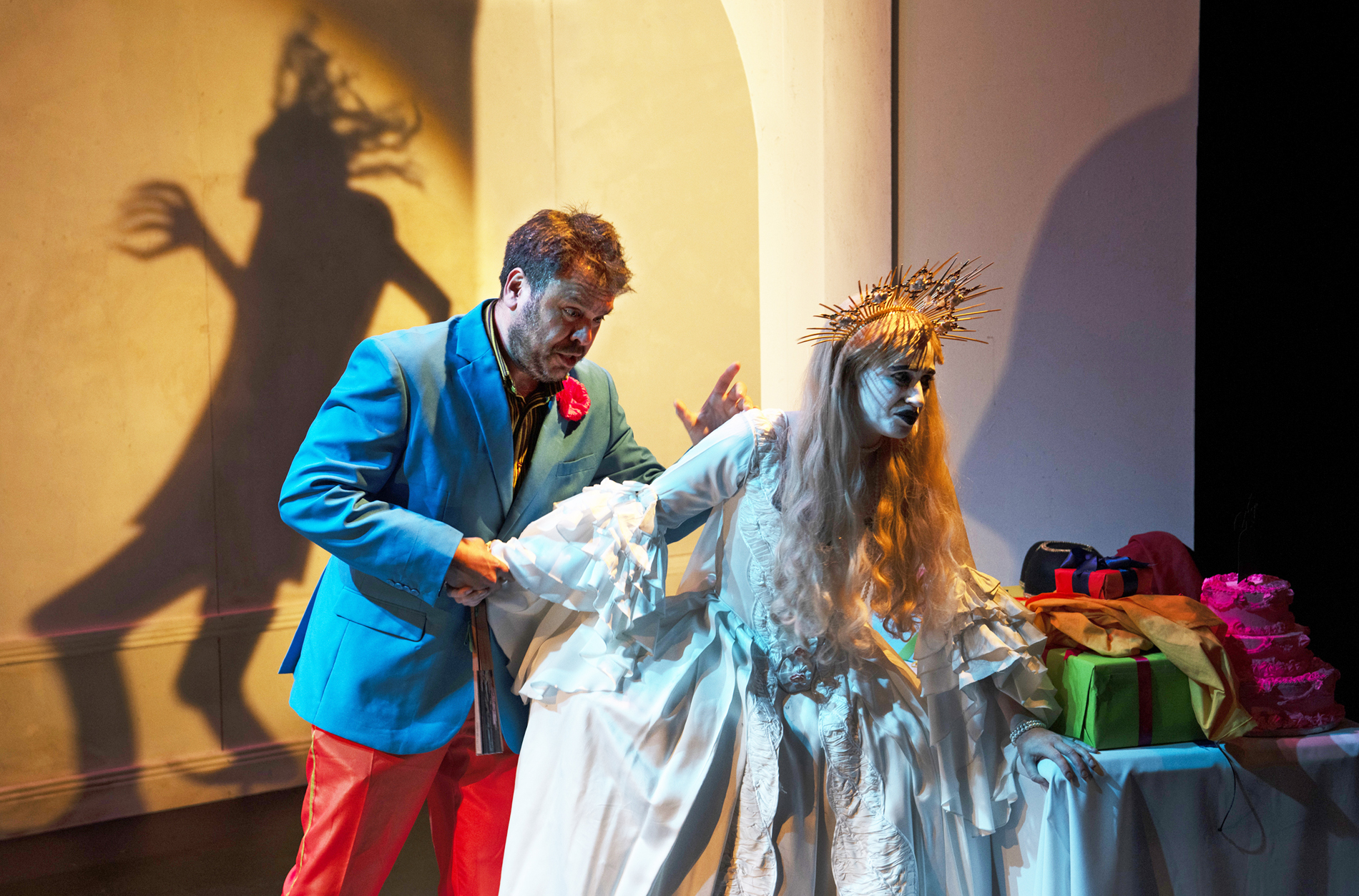 More first-rate singing, this time matched to a thoughtful production, was to be found in the studio staging of Zemlinsky's The Dwarf (★★★★), a powerful setting of Oscar Wilde's fairy tale The Birthday of the Infanta, which was the name it went under when performed in an altered version at the Royal Opera in a Zemlinsky double bill with a very different Wilde tale, A Florentine Tragedy. The knockout performance then belonged to Kenneth Riegel as the eponymous singer who thinks he's handsome; seeing himself in a mirror will ruin his life. Riegel went around on all fours with a shock of red hair, and sang this killer heroic-tenor role superbly.
More first-rate singing, this time matched to a thoughtful production, was to be found in the studio staging of Zemlinsky's The Dwarf (★★★★), a powerful setting of Oscar Wilde's fairy tale The Birthday of the Infanta, which was the name it went under when performed in an altered version at the Royal Opera in a Zemlinsky double bill with a very different Wilde tale, A Florentine Tragedy. The knockout performance then belonged to Kenneth Riegel as the eponymous singer who thinks he's handsome; seeing himself in a mirror will ruin his life. Riegel went around on all fours with a shock of red hair, and sang this killer heroic-tenor role superbly.
As does Charne Rochford, though no diminished stature is conveyed here; only his bright clothes suggest a touch of clownishness, and a silhouette how he looks to the Spanish court. They're the grotesques in silent-film horror make-up, led by Eleri Gwilym as Donna Clara, the capricious princess who will break the Dwarf's heart – a magnificent impersonation of Bette Davis as Baby Jane (the two pictured above). Chamberlain Don Estoban (Ross Cumming and the many smaller female roles (maids and Infanta's companion) were all well sung and looked good – as in weird – in Lisa Krugel's designs under Maksym Diedov's flexible lighting (curtain call pictured below by Jim Chamberlain).  What a shame, though, that this could not have been a main stage production with orchestra; music director Christopher Knopp heroically and expressively played all the notes on one piano, but four hands (as in Zemlinsky's masterly transcription of Mahler's Sixth Symphony) would have been even better. Yet once you've heard the chordal shifts of the Dwarf's essential sadness coloured by cor anglais, you can't forget what the colour-conscious score can sound like.
What a shame, though, that this could not have been a main stage production with orchestra; music director Christopher Knopp heroically and expressively played all the notes on one piano, but four hands (as in Zemlinsky's masterly transcription of Mahler's Sixth Symphony) would have been even better. Yet once you've heard the chordal shifts of the Dwarf's essential sadness coloured by cor anglais, you can't forget what the colour-conscious score can sound like.
A bigger budget was available for the second of the three main productions, Handel's final opera seria Deidamia, shared with the wonderful Göttingen Handel Festival (★★★★). The libretto hits the mark at times in its treatment of Achilles' hideaway on the island of Skyros to avoid a prophesied death at Troy. The original story – far stronger a candidate for the festival theme of "mythology" than the Verdi farrago – does indeed involve his love for Deidamia, with whom he had a child, and his disguise as a huntress, seen through by the wily Ulysses who's come to get him back for the Greek army. 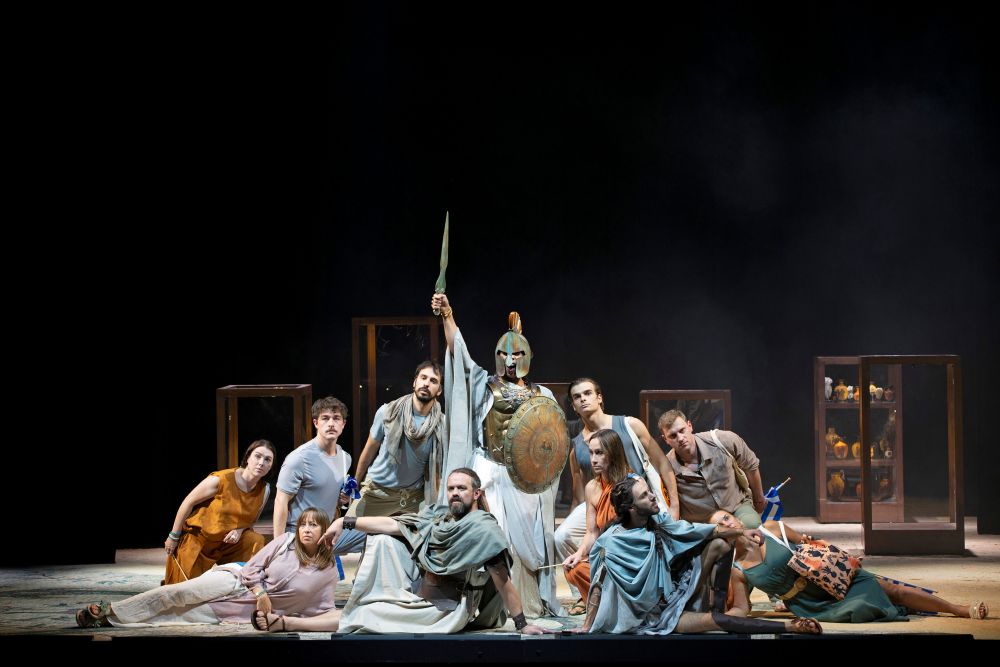 Inevitably, though, the love tangles obscure the drama. Deidamia remains an insubstantial figure until halfway through, and her confidante Nerea, in more skittishly-treated love with the Greek Phönix (Rory Musgrave), doubles the quotient of unnecessary arias (the opera could be cut by a quarter). No criticisms about any of the performances, though: Sophie Junker rises to her big aria of prophetic grief towards the end of the first half and is magnificent in the schizoid number that shows Handel at his best in her inconsolable sorrow and rage. Sarah Gilford does what she can with Nerea, but the pretty scene they share in a vineyard is otiose after the original touches of martial authority in the men's introductory numbers.
Inevitably, though, the love tangles obscure the drama. Deidamia remains an insubstantial figure until halfway through, and her confidante Nerea, in more skittishly-treated love with the Greek Phönix (Rory Musgrave), doubles the quotient of unnecessary arias (the opera could be cut by a quarter). No criticisms about any of the performances, though: Sophie Junker rises to her big aria of prophetic grief towards the end of the first half and is magnificent in the schizoid number that shows Handel at his best in her inconsolable sorrow and rage. Sarah Gilford does what she can with Nerea, but the pretty scene they share in a vineyard is otiose after the original touches of martial authority in the men's introductory numbers.
There's a piquancy in having a countertenor who sounds like a sopranist, Nicolò Balducci, and another who advertises himself as one, Bruno de Sá, convincing at first in female disguise; both are fine. Petros Magoulas as profound Lycomedes excels and gets one of the most beautifully staged scenes – under water, I'm not sure why – just before the interval. George Petrou triumphs in the double feat of conductor and stage director, kicking off with the liveliest of sounds from the adaptable Wexford Festival Opera Orchestra and promising us a double action with contemporary tourists on Skyros and true ancient Greeks. 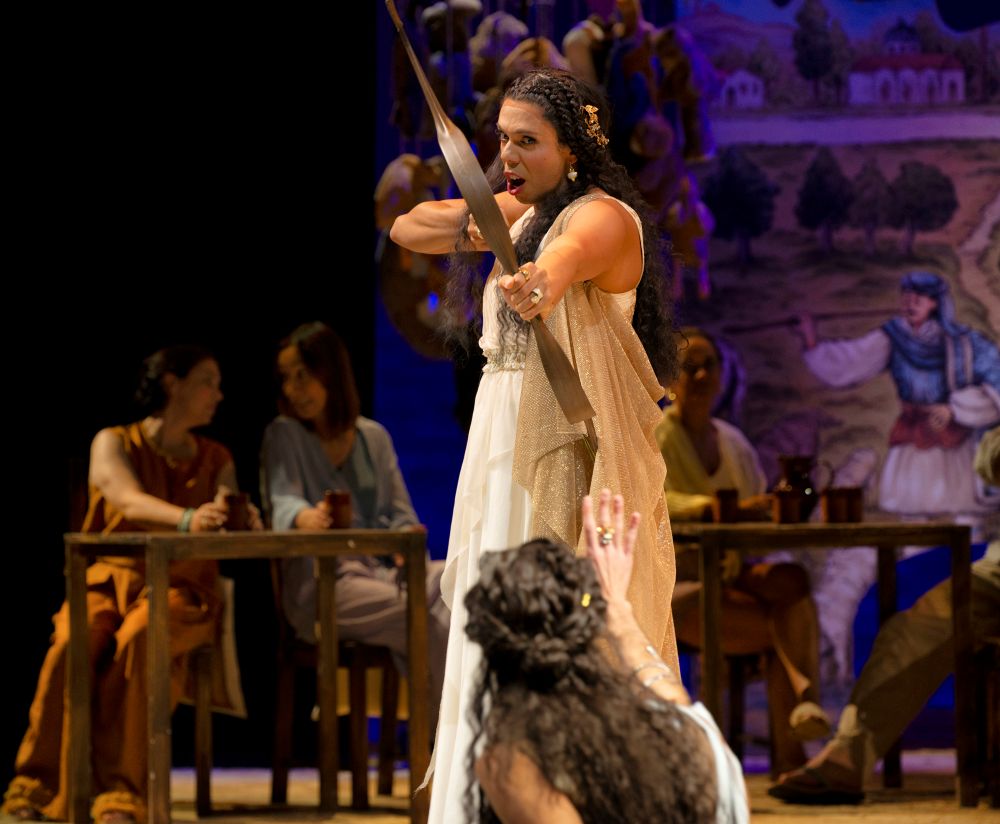 At first it seems as if this might be a way of filling in da capos with stage business, but it holds and moves us from light to darkness as the threat of war comes closer. The constant ingenuity and beauty of the scene changes keep us entertained, remarkably so in the hunting sequence after the interval, boosted by some of the liveliest arias (de Sá pictured above), and in the museum trawl which follows: Georgina Germanou's sets and costumes and Arnhim Friess' production designs are of the highest order. And so, despite the longueurs, it's a delicious entertainment with a bit of food for thought.
At first it seems as if this might be a way of filling in da capos with stage business, but it holds and moves us from light to darkness as the threat of war comes closer. The constant ingenuity and beauty of the scene changes keep us entertained, remarkably so in the hunting sequence after the interval, boosted by some of the liveliest arias (de Sá pictured above), and in the museum trawl which follows: Georgina Germanou's sets and costumes and Arnhim Friess' production designs are of the highest order. And so, despite the longueurs, it's a delicious entertainment with a bit of food for thought.
The same can't be said of the showcase for the young Factory Singers. Rossini's Il viaggio a Reims (★★) offers plenty of opportunities as folk of different nations gather at an inn – here a health spa, using sets left over from last year's similarly located Le maschere. But their motivations are further confused by Festival Artistic Director Rosetta Cucchi's messy concept. Sorry – I didn't laugh once, which I certainly did a lot during the 2023 production of L'Italiana in Algeri. Cucchi starts with what's a no-no these days, a persistent nervous tic for clinic manager Madama Cortese (a game Maria Matthews in the performance I saw) and ends with even more of the same in a dark conclusion that works no better than anything else. Still, the famous big ensembles come off under Hartinger (pictured below by Jim Chamberlain saluted by the cast at the curtain call), and there's starry promise from Jane Burnell (Contessa di Folleville), Ihor Mostovoi (Don Profondo) and Gabe Clarke (Cavalier Belfiore). Not to mention consummate onstage turns from flautist Kieran Moynihan and harpist Dianne Marshall.  Fortunately a day of solid rain had been covered by three events on Thursday. After Viaggio, the downpours of Friday morning had ceased, leaving us with a sunny afternoon like Wednesday's, good reason for walking to the magical Wexford Bird Reserve on what are unattractively called the Wexford Slobs (land reclaimed, polder-like, in the 19th century behind a sea wall, now home to a huge overwintering population of Greenland White-breasted geese, visible from the observation tower). How I'd love to have stayed for the evening performance of the third main opera, Delius's The Magic Fountain. This seems to have had an inexplicably rough ride from the critics, who may not have liked the music but should have given more credit to a cast and production in tune with Delius's sincere and gentle late-romantic vision.
Fortunately a day of solid rain had been covered by three events on Thursday. After Viaggio, the downpours of Friday morning had ceased, leaving us with a sunny afternoon like Wednesday's, good reason for walking to the magical Wexford Bird Reserve on what are unattractively called the Wexford Slobs (land reclaimed, polder-like, in the 19th century behind a sea wall, now home to a huge overwintering population of Greenland White-breasted geese, visible from the observation tower). How I'd love to have stayed for the evening performance of the third main opera, Delius's The Magic Fountain. This seems to have had an inexplicably rough ride from the critics, who may not have liked the music but should have given more credit to a cast and production in tune with Delius's sincere and gentle late-romantic vision.
Luckily we can see it for ourselves in one of the year's three films on YouTube via RTÉ (★★★★). There is so much fine orchestral writing, finely conducted by Francesco Cilluffo, starting with the Prelude and including the Act Two postlude; vocally, less, though the awkwardness could be mitigated by changing "thee" and "thine" to "you" and "yours". Nevertheless what is essentially a two-hander for tenor adventurer Solano and native American Watawa, who has sworn revenge on the white man for so much destruction, gives them both grateful music to sing in the short third act, when they reach the magic fountain which may bring life or death. Christopher Luscombe's staging, spare and beautifully lit, honoured the essential truthfulness of the work. You couldn't have asked more from Dominick Valdés Chenes, a plausible dreamer, or Axelle Saint-Cirel, so dignified and proud throughout and dispelling charges of cultural appropriation. Watch at least the last act below and decide for yourselves.
Watch Delius's The Magic Fountain from Wexford Festival Opera on YouTube (starts at 15m28s)
- Le trouvère and Deidamia also available on YouTube
- More opera reviews on theartsdesk
The future of Arts Journalism
You can stop theartsdesk.com closing!
We urgently need financing to survive. Our fundraising drive has thus far raised £49,000 but we need to reach £100,000 or we will be forced to close. Please contribute here: https://gofund.me/c3f6033d
And if you can forward this information to anyone who might assist, we’d be grateful.

Subscribe to theartsdesk.com
Thank you for continuing to read our work on theartsdesk.com. For unlimited access to every article in its entirety, including our archive of more than 15,000 pieces, we're asking for £5 per month or £40 per year. We feel it's a very good deal, and hope you do too.
To take a subscription now simply click here.
And if you're looking for that extra gift for a friend or family member, why not treat them to a theartsdesk.com gift subscription?
more Opera
 theartsdesk at Wexford Festival Opera 2025 - two strong productions, mostly fine casting, and a star is born
Four operas and an outstanding lunchtime recital in two days
theartsdesk at Wexford Festival Opera 2025 - two strong productions, mostly fine casting, and a star is born
Four operas and an outstanding lunchtime recital in two days
 The Railway Children, Glyndebourne review - right train, wrong station
Talent-loaded Mark-Anthony Turnage opera excursion heads down a mistaken track
The Railway Children, Glyndebourne review - right train, wrong station
Talent-loaded Mark-Anthony Turnage opera excursion heads down a mistaken track
 La bohème, Opera North review - still young at 32
Love and separation, ecstasy and heartbreak, in masterfully updated Puccini
La bohème, Opera North review - still young at 32
Love and separation, ecstasy and heartbreak, in masterfully updated Puccini
 Albert Herring, English National Opera review - a great comedy with depths fully realised
Britten’s delight was never made for the Coliseum, but it works on its first outing there
Albert Herring, English National Opera review - a great comedy with depths fully realised
Britten’s delight was never made for the Coliseum, but it works on its first outing there
 Carmen, English National Opera review - not quite dangerous
Hopes for Niamh O’Sullivan only partly fulfilled, though much good singing throughout
Carmen, English National Opera review - not quite dangerous
Hopes for Niamh O’Sullivan only partly fulfilled, though much good singing throughout
 Giustino, Linbury Theatre review - a stylish account of a slight opera
Gods, mortals and monsters do battle in Handel's charming drama
Giustino, Linbury Theatre review - a stylish account of a slight opera
Gods, mortals and monsters do battle in Handel's charming drama
 Susanna, Opera North review - hybrid staging of a Handel oratorio
Dance and signing complement outstanding singing in a story of virtue rewarded
Susanna, Opera North review - hybrid staging of a Handel oratorio
Dance and signing complement outstanding singing in a story of virtue rewarded
 Ariodante, Opéra Garnier, Paris review - a blast of Baroque beauty
A near-perfect night at the opera
Ariodante, Opéra Garnier, Paris review - a blast of Baroque beauty
A near-perfect night at the opera
 Cinderella/La Cenerentola, English National Opera review - the truth behind the tinsel
Appealing performances cut through hyperactive stagecraft
Cinderella/La Cenerentola, English National Opera review - the truth behind the tinsel
Appealing performances cut through hyperactive stagecraft
 Tosca, Royal Opera review - Ailyn Pérez steps in as the most vivid of divas
Jakub Hrůša’s multicoloured Puccini last night found a soprano to match
Tosca, Royal Opera review - Ailyn Pérez steps in as the most vivid of divas
Jakub Hrůša’s multicoloured Puccini last night found a soprano to match
 Tosca, Welsh National Opera review - a great company reduced to brilliance
The old warhorse made special by the basics
Tosca, Welsh National Opera review - a great company reduced to brilliance
The old warhorse made special by the basics
 BBC Proms: The Marriage of Figaro, Glyndebourne Festival review - merriment and menace
Strong Proms transfer for a robust and affecting show
BBC Proms: The Marriage of Figaro, Glyndebourne Festival review - merriment and menace
Strong Proms transfer for a robust and affecting show

Add comment